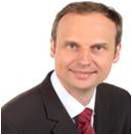For Constant heart. Upbeat ideas for heart disease.
- Location
- Elgar Concert Hall - Bramall Music Building
- Dates
- Tuesday 2 October 2012 (16:00)

Professor Paulus Kirchhof from the School of Clinical and Experimental Medicine gives his Inaugural Lecture.
Paulus Kirchhof obtained his medical degree at the University of Münster in 1997 after studying Medicine in Heidelberg (Germany), Münster (Germany), Lille (France), Concepcion (Chile), Zürich (Switzerland) and at Georgetown University (Washington DC, USA). He trained as a cardiologist with a specialisation in interventional cardiology and interventional electrophysiology and obtaining a subspecialisation in intensive care medicine at the Department of Cardiology and Angiology, University Hospital Münster from 1997-2006. After training, he worked there as staff cardiologist (Oberarzt) from 2006 – 2011. In 2011, he moved to University of Birmingham as Chair in Cardiovascular Medicine and consultant cardiologist at SWBH NHS Trust. He began his scientific career with a thesis on the upper limit of vulnerability for defibrillation shocks supervised by Michael Franz at Georgetown University. At University of Münster, he helped to set up two collaborative research centres in Münster as is a founding member of the German Atrial Fibrillation competence NETwork (AFNET). His research received several prizes from University of Münster and German Cardiac Society, and resulted in an appointment as Associate Professor in 2007. He is active in the European Society of Cardiology, the European Heart Rhythm Association, for European and UK regulatory bodies, and in international research consortia. He has helped to translate pathophysiological concepts into new types of therapy which can be tested in investigator-initiated clinical trials, such as of short-term antiarrhythmic drug therapy after cardioversion or the idea of early rhythm control therapy in atrial fibrillation. He currently studies the interaction of genetic predispositions with ambient stressors in the development of heart failure and arrhythmias.
This lecture is open to all.